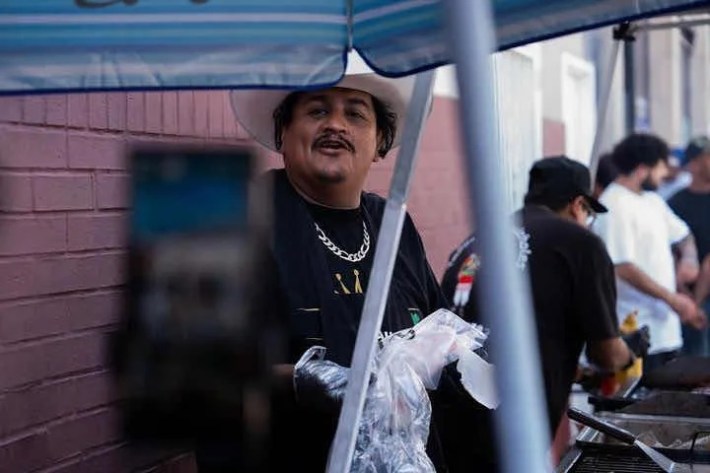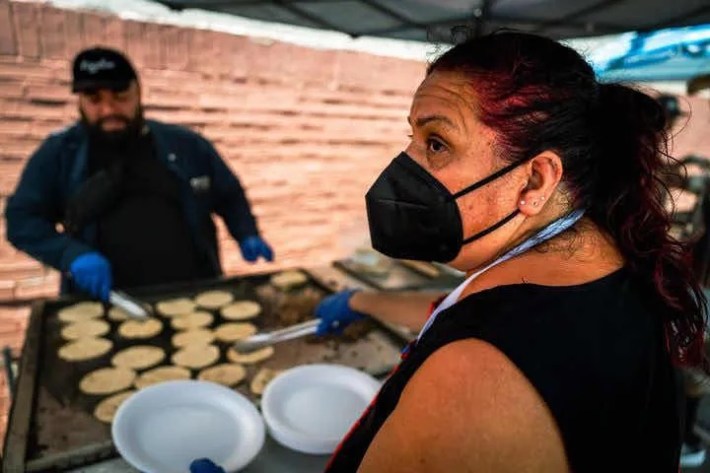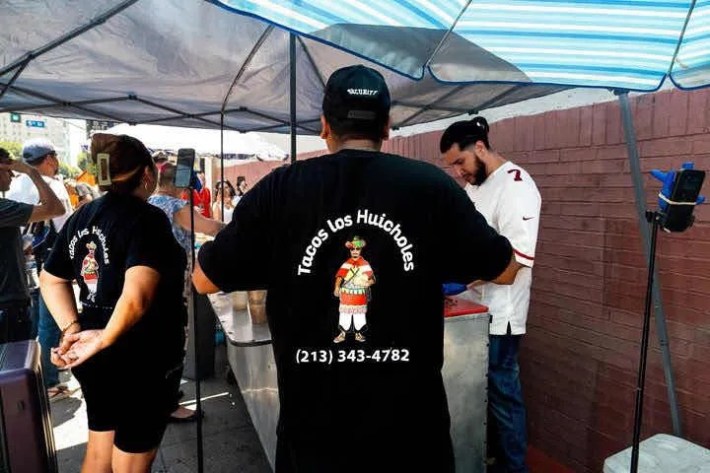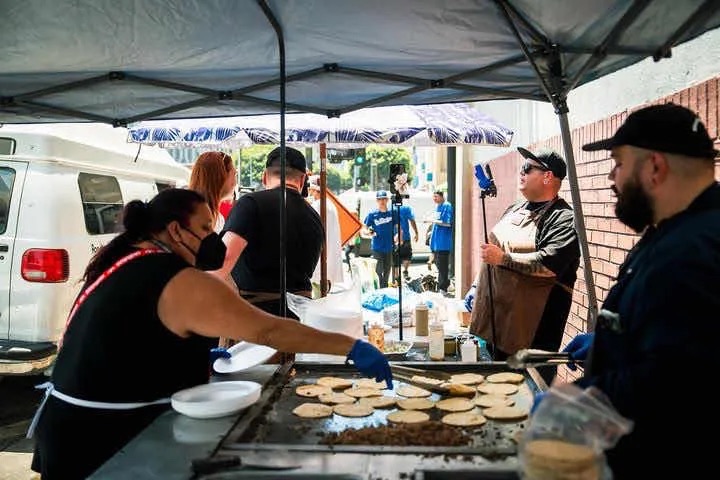On the corner of 5th and San Pedro streets, at the heart of Downtown L.A.’s Skid Row, a group of street vendors is making it their mission to provide a sense of home to the neighborhood’s unhoused community, one plate at a time.
Tacos Los Huicholes, Klover King, and L.A. Glizzy operate a weekly pop-up on Skid Row. On Fridays, they prepare food for over nine hours straight while broadcasting live on TikTok to thousands of viewers.
The concept started with the founding of Klover King by owner Christopher Bailey, a formerly unhoused street vendor. Alongside his collaborators, it has blossomed into a full-blown act of humanitarianism.
The vendors arrive around 10 AM on Fridays to start setting up. Although they all have small food businesses, they dedicate much time to preparing for their weekly Skid Row service. The vendors start buying food and materials days in advance.
On the first day, they fed about 450 people. On the second Friday, they served over 1,000; by the third Friday, they had reached about 1,600 people.
Bailey quickly recognized the potential of social media platforms like TikTok to mobilize support for the project.


"My idea was, if we just go pop up downtown, set up food, it’ll all come together, and [we can] use the TikTok platform to fund it," he explained.
After initially funding the operation out of his own pocket, with help from Tacos Los Huicholes, it now runs on the generosity of donors, whose generosity directly impacts the amount of food they can prepare.
"We put the money together and started it,” he says. “And I got on the [Instagram] Live, and I'll say, 'Look guys, I got about 100 hot dogs. If you guys want to DoorDash anything for us to keep this going, I'll stand out here, and I'll cook all night long. As long as you guys keep sending supplies.'"
The response was overwhelming.
Tacos Los Huicholes, Klover King, and LA Glizzy feed hundreds of people every Friday. Although the food is free, quality and taste are still important factors for them. The vendors spend hours seasoning and grilling carne asada, turkey/pork hotdogs, and patties on the spot. They even make their own salsas for taco days. In an attempt to diversify their food selection, they change up their daily menu every two weeks.
"They would literally send so many DoorDashers with whatever we were running out of,” Bailey remembers. “We'd say, 'Okay, guys, we need more buns.' Within 10 to 15 minutes, two or three DoorDashes show up with bags and bags of buns, condiments, and onions. And, man, it was crazy."
This support from the TikTok community has been instrumental.
"The craziest thing about it is, all these people from TikTok, they want it now,” he says. “They're so excited to be like, 'Oh, we can't wait for Friday, we got our DoorDashes ready, you know, we're ready to send whatever you guys need.'"
This enthusiastic backing has allowed Bailey to maintain and even expand his efforts, showcasing the power of community and the potential of social media to drive positive change in communities.
"Being sober and having a place to live, you know, it was like stability,” Bailey tells L.A. TACO. “So I tried to bounce back, and the street food business was at the Van Nuys courthouse, and it was doing quite well.”
Christopher Bailey A.K.A. @CloverKing on TikTok
At 43, Bailey has experienced the lowest lows of homelessness and addiction and the highest highs of recovery and redemption. After battling with drugs and suffering from a heart attack, the Tiny Homes project was able to get him back on his feet.
Looking for a way to start up his new life, Bailey began selling breakfast burritos outside the Van Nuys Courthouse.
"Being sober and having a place to live, you know, it was like stability,” Bailey tells L.A. TACO. “So I tried to bounce back, and the street food business was at the Van Nuys courthouse, and it was doing quite well.”
However, it was TikTok that catapulted his venture to new heights. "TikTok took it to a whole new level. It was incredible how fast my business picked up. And my followers started gaining, and suddenly, my lives started really going crazy."
Bailey recalls going out to Skid Row with friends to give out extra food in the hours after he closed his street spot for the day. His loyal fanbase, growing on TikTok, began donating more and more food for him to continue, which helped it become the larger-scale pop-up it is now.
Bailey's success in escaping dire poverty has inspired him to give back to those in need, particularly the homeless community in Skid Row.
"I want to give back,” he says. “I feel like I'm blessed enough and able to give back to these people, [who are] where I've been before. I feel like it's what I'm supposed to be doing in my life right now."
Jerry, also known as L.A. Glizzy, is one of the starting partners in this growing vending group. What began as just him selling the staple bacon-wrapped hotdogs in South Central became a TikTok frenzy.
Through social media, Bailey discovers Jerry and sees something in him that no one has ever had. “This is a collective get-together of me and my friends doing something positive. It feels good to do something so selfless. The energy is unmatched,” Jerry says.

Shortly after that, Bailey takes him under his wing, and the two begin uniting their powers to bring more free food to the community.
As a previously unhoused individual, Jerry is more than grateful to be able to give back to people in a situation where he once was.
Jimmy Medina, the owner of the family-run taquería Los Huicholes, took a leap of faith by joining Bailey and launching the Skid Row popup with full steam. Joining Bailey in these acts of service has opened new doors within their own enterprise.
Along with his wife, Vanessa, and son, Jimmy Jr., the family has connected with the Skid Row community more than they could’ve imagined.
Their taco business was not just about selling delicious food—it was a testament to overcoming adversity. Medina, a former security officer who faced workplace harassment and discrimination due to his dyslexia throughout his career, turned to cooking when it came time for a change.
Although Medina had never experienced homelessness, participating in these street food donations every Friday in Skid Row is a powerful expression of giving back and nothing short of transformative.
"It just feels so good, so great being there,” Medina says. “It was my first time going into Skid Row. I was very emotional throughout the whole day.”
“A lot of people have told us, 'You guys are doing it for the clout and attention and all that,'” he says. “You might see it that way, but when you’re there, working for that, you could feel the love and compassion so much it hurts.”
Medina also emphasized the importance of recognizing the humanity of those they serve.
“[People] look at them like they're not people like they're just trash or something,” he says. “No, they're people. They're human beings. They're there for a reason. We don't know what's behind their life story, why they're there. It's all about sharing the love and meeting the need.”
Along with his team, “Tio Jimmy,” as people from the community now call him, is committed to expanding these efforts, aiming to provide resources beyond just food to support the Skid Row community.
“We want to continue,” he said. “We want to do more than what we’re doing.”
Although these vendors have only been setting up for the last four weeks, they all have plans to continue giving back to the community.
“My main goal is just to be happy and successful,” Bailey says. “If I can bless anybody along the way, it's a big part of who I am.”







